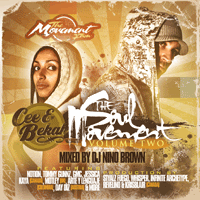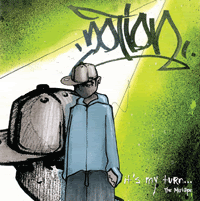
Internal beefs among rap crews have gotten so cliché that you can pretty much pencil them in right after the 3:00 viral video upload. Money, affairs of the heart and inflated egos have caused many of us to think about our favorite group and echo the sentiments of Chris Rock’s character in Boomerang, saying, “First the Fat Boys break up, now this shit?”
Having seen D-12’s rift with Royce Da 5’9”, and David Ruffin’s with The Temptations before them, if you want to take the historical approach, break ups are nothing new to Slum Village. While they never officially broke up, the death of J Dilla and Baatin’s bout with schizophrenia prevented the group from making an album with all four members of what is arguably Motown’s longest tenured Hip Hop outfit. But, even after a hiatus of over three years, each member will tell you that the mutual love and respect is still there.
T3 has witnessed the ups and downs from day one. During a conversation with HipHopDX covering the many peaks and valleys of Slum Village, he explains how his crew has turned tragedy into a catalyst for creating what may be their best work yet.
HipHopDX: How far along is the album, and is there a release date?
T3: There is a tentative due date for about June or May. The album is done for the most part. The music is a lot bigger and the lyrics are a lot better. It was mixed like that, and everything has that big sound. It’s still got some soul to it. It’s called Village Manifesto, and what we’re really trying to say is…I don’t know. We really talk about a lot. I really feel niggas stepped up their lyrical game.
One of the things we talk about it what’s going on in the economy. We had to address that even though we took our own approach. We’re really addressing what goes on in our everyday lives and what we’ve been doing in the last three-and-a-half years. People are wondering, “What y’all doing? Where y’all been?” They might have seen me doing something and Baatin and Elzhi doing something else, so we talk about that on the album. We also had a little bit of fun, ‘cause ‘Tin brought that fun factor back.
DX: So the rumor is that you guys worked with Focus and Marsha Ambrosius from Aftermath on the single?
T3: Yeah that’s true, and it came out lovely.
DX: Were you planning on that, or was it another collaboration spawned by CalTroit?
T3: You know, that Cali and Detroit connection has been going on for a minute. You can go back to “Forth and Back,” where Dilla was at the forefront of that. We’ve just been keeping it going since then.
DX: The industry is in a completely different space now, and the recession doesn’t help. What platform will this be released on?
T3: If I had to guess, I would say mostly digital. But I don’t have no set details. We’ll let the label work out what they work out, and then go from there. It ain’t really about putting records in stores no more. That’s kinda old school, and most of the stuff is online anyway. I know I buy my stuff online unless I’m digging for old, old vinyl.
Majors are falling apart as we speak. There’s probably another 300 job layoff happening somewhere right now. We’ve got a strong enough fan base to push the music, so people can just be ready for whatever platform it comes out on.
DX: From an artistic standpoint, things are also going digital with a lot of Electronica and Auto-Tune being incorporated…
T3: Yeah, but we always had a digital sound. Coming from Detroit, we always had that Techno vibe. So we always put a little bit in there, but we didn’t do a 180 and go strictly digital. We still try to keep it Soul, because I feel there’s a lane open to do what we do.
At the end of the day, I feel Slum Village always made good, lady-pleasing records. That means we know how to make a good single. We’ve got the kind of music that can touch a lot of folks, and it’s time for us to come back to the forefront.
DX: In line with that, do you think people will finally figure out what the Slum Village lane is? You guys talk about some grimy stuff sometimes, but you’re always lumped in with more “conscious” groups.
T3: Yeah, but most of our boys are on that conscious tip…I guess you could say that. The music sounds like that, but lyrically we’ve always had a street edge to our music. We’re kind of the black sheep of that group. I don’t ever remember Slum Village doing a political song. But as long as you’re digging the music, I don’t care.
DX: T3 and Baatin went to school together, and Elzhi and T3 allegedly hooked up a management agreement over a slice of pizza. Do you think meeting in that organic sort of fashion plays a part in your longevity?
T3: I think it does. Through the years, our chemistry together…we’ve been building this thing for a minute. We’ve been adding pieces to our Voltron for quite some time now. I feel like it’s getting stronger. The Detroit movement is getting stronger, and we’re just making great music. There’s a lot of cats doing their thing, and I feel like we started that. We’re at the forefront of that, and it’s something we’re just gonna keep pushing in the name of Dilla and Proof.
DX: In regards to your Voltron analogy, did pursuing solo projects change your approach to working together?
T3: Yeah, it’s much different from when you’re doing your own thing. We’ve just been grinding, and it’s been a long time since we’ve come out with a record. It’s had to have been at least three-and-a-half years now. When I go off and do my Night Gallery project, which is still not out yet, that just enhances our skills for when we come back. When Elzhi goes off and does Witness My Growth or The Preface, it’s the same thing. When we come back, it allows us to bring more to the table when we combine as a unit.
And just bringing ‘Tin back is what really excites me about this new Slum Village album. Having Baatin back brings that rambunctious energy and that character that Slum had been missing. That’s really changed our perspective on how we did this album.
DX: I wanted to get in to that, because there were obviously some things said back and forth on the two albums he wasn’t on…
T3: I can never get mad at ‘Tin! Baatin was dealing with some issues, but you’ll never hear me lashing back at him on any interview. And you never heard El lash out at him on any interview either. That’s just ‘Tin, and he’ll always be a part of the group. Even when he ain’t a part of the group, he’s a part. That’s just history, man. He’s always gonna be a part of what Slum Village stands for. I mean…
DX: True, but even families have their fights from time to time. Was there ever a point where you had to sit down together and address everything that happened?
T3: Yeah, but it wasn’t even like that. It was more like, “‘Tin ain’t been doing nothing. I really want to see this brother come out and do his thing.” He worked on a couple projects here and there. But I felt like I wouldn’t have wanted us to do this album without Baatin. We talked about doing an album with me, ‘Tin, Dilla and El, but it never came about. So when Dilla passed, it was like, “Well, we gotta have ‘Tin as a part of the next Slum record.” And now we’re even incorporating Illa J as a part of this album too. I think we’re all family, and we’ve all come together to make great music.
DX: Not too harp on the subject of Baatin’s hiatus, but there’s a stigma in the Hip Hop community as far as dealing with mental and physical issues. Having been through Baatin's schizophrenia and Dilla's death, does that change your personal outlook?
T3: Yeah, sadly that’s something that happens sometimes. People go through things, and most people don’t talk about it. We put it out there, especially El when he did “Reunion.” We just tell people the situations we’re dealing with, and we didn’t want people to be in the dark. I would never kick Baatin out of the group or anything like that. He was dealing with some issues, and he’s better now, so let’s make music. That’s all it boils down to.
DX: You brought up lyricism earlier, and there are two schools of thought about how you guys spit. Your detractors label you inferior lyricists, while fans call it a different style that uses the voice more as an instrument with different cadences. At any point did you feel compelled to step up the lyrics?
T3: [Laughs.] No. I feel like people as a whole…we stepped the lyrics because that’s what we felt like. But I don’t ever want to pigeonhole Slum Village like, “Oh we gotta be the lyrical kings!” Nah, that’s not really what we’re about. We’re just about making great songs. If you want to go lyrical, we know Elzhi can just about eat up anybody by himself. He was that addition we decided to bring to Slum Village. But I don’t need that same judgment for Baatin or me, because you may not understand the creative stuff that we do. Baatin also sings, and I make beats and write a lot of the hooks.
When you think of emcees, you just think of rapping in front of a mic, and I’m more of a producer myself. I like to put the picture together, and Baatin is more of a character. He’ll give you different pieces with the way he does voices and adds visuals. A lot of people don’t understand that, or maybe they don’t even care about it, but it all forms together. I just think people need to quit judging things thinking, “This is how an emcee is supposed to rap,” or “This is what a rapper is supposed to do.” I guess that’s the nature of the game, so we’re just gonna keep doing what we’re doing. There’s always gonna be somebody with something to say, so we ain’t really trippin’.
DX: So with these different elements you all bring to the table, how does it work when it’s time to hit the lab and make tracks?
T3: Most of the time, me and Young RJ put down the foundation. Young RJ has always been a part of our movement since Fan-Tas-Tic Vol. 2, because he grew up with us as a lad. [Laughs] It could be us two, or Kareem Riggins or whichever producer is handling it. But 85% of the time, I’m the one who starts it off. There’s times when El or ‘Tin has concepts or titles for the album and we usually add those. So I’ll set it off a majority of the time, and ‘Tin will come in and give it that flavor. Then El usually comes in to seal the deal.
DX: Let’s dig into some of the old stories behind Slum Village. Did the group’s name come from Phife Dawg’s verse on “Butter” ?
T3: No, that was some dictionary stuff. Me, Wajeed and Dilla were looking for names. We put it together, and it was funny how Phife said it too, but we really didn’t get it from there. It was the first thing we sampled on Fan-Tas-Tic, so we really wasn’t mad about it. Originally we were the Slum Brothers, ‘cause this was when everybody was on the whole peaceful vibe with the African pendants. You remember the necklaces and stuff?
DX: Oh yeah, the leather, African medallions with the patch inside…
T3: [Laughs] Yeah, but after that died out, we changed it to Slum Village. So that’s how that started out. But I feel like we are connected with Tribe, because Q-Tip was the first person to put us out there and go on record as endorsing Slum Village. So we’re definitely connected.
DX: True. Moving on to another album, in past interviews, you guys have said that Trinity almost didn’t get made. Considering all the obstacles you had to overcome to put that out, do you think it made you stronger as a group?
T3: Hmmm…at the end of the day, I think so. But, if it was up to me, it never would’ve happened. I guess it was meant to happen, because that pressure made me become the leader of Slum Village when I didn’t want to be. It worked for us, and we did three albums after that which were mostly successful. Sometimes you don’t know what God has in store for you, and you just gotta roll with the punches. With that, I just had to man up and Trinity happened. There are a lot of things I hear on Trinity that I loved, and there are other things that have me going, “Ooh, that mix...” I really want to go back and redo Trinity. We can use the same music, but just redo the whole album over. It might happen one day. Believe it or not, that was our most commercially successful album; it sold the most records. It outsold [Fan-Tas-Tic] Vol. 1 and 2, which most people consider classics, so you never know.
DX: Yeah, I think a lot of people were pleasantly surprised with “Tainted” and both versions of “One.”
T3: Oh yeah, we had the Dirty District joint. That was me and RJ in the lab making beats again. We did a lot of joints on that Dirty District album. We’re re-releasing that too.
DX: That’s good to know. Unless you’re grabbing it off of the Internet, that’s been hard to find. On a totally unrelated note, what are the chances of getting a big Detroit compilation together with Slum, Black Milk, Royce, Guilty and everyone else?
T3: Yeah, I think so man. We’re always on each others' albums, but we haven’t put it all together. Now that everybody is getting their recognition, it’s time for that. We have talked about it. It’s not official yet, but it’s definitely something we’ve thought and talked about. Everybody’s doing their thing and everybody’s got records coming out this year. Since we’re all on the road, we might as well seal the deal on all of that.
It’s just getting people to split that deal. Doing the songs isn’t a problem, but the tour times don’t always match up with everybody on the road. And then, somebody has to take that cut. And in this economy—I don’t know. [Laughs] That’s the only thing slowing that up, so I don’t know about that just yet. Let’s get a couple more dollars, then we can all do it.
DX: Good point. Keeping with our tradition of random, Rap nerd trivia, can you explain the different cameos in the “Climax” video?
T3: [Laughs] You know what? Everybody was excited about the album, and they wanted to be in the video. So we figured, “Well we know it’s a girl song, but we’re gonna put you in the video anyway.” That’s what we did, and that’s how we got ?uestlove and everybody else in there. ?uest was like, “Nah man, I don’t wanna get in trouble!” but we got him in there. I don’t know why they didn’t bring everybody into “Raise It Up,” because we shot those right after each other. Since everybody was family, we figured, “Okay let’s do it.”
DX: Between Gary Coleman, Simeon Rice and Saafir, y’all raised a lot of eyebrows.
T3: Simeon Rice is kin to the label, he’s literally family. And Saafir? We were big fans of his back in the day.
DX: Word, you guys were up on that Boxcar Sessions album too?
T3: Yes, yes, yes. That was like one of my favorite, obscure west coast rappers; he’s definitely one of our favorites. His style was just so different from everybody else’s.
Author: Omar Burgess
Some old, but classic Villa with 'Climax'





























No comments:
Post a Comment